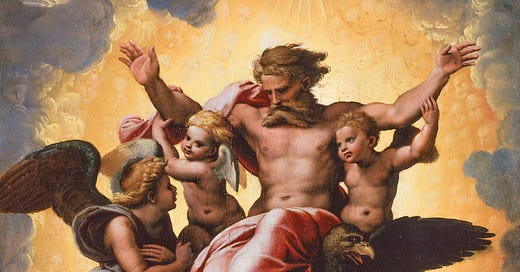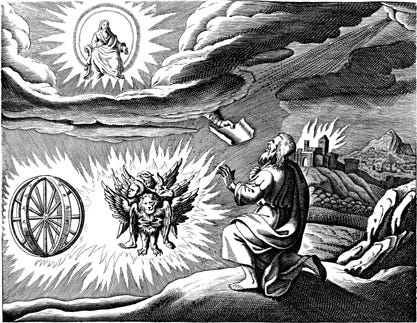The first reading and psalm attempt to describe God in human terms. That is, obviously, impossible, but what else can they do but try anyway?
Reading 1
Ez 1:2-5, 24-28c
On the fifth day of the fourth month of the fifth year, that is, of King Jehoiachin's exile, The word of the LORD came to the priest Ezekiel, the son of Buzi, in the land of the Chaldeans by the river Chebar.—There the hand of the LORD came upon me.
As I looked, a stormwind came from the North, a huge cloud with flashing fire enveloped in brightness, from the midst of which (the midst of the fire) something gleamed like electrum. Within it were figures resembling four living creatures that looked like this: their form was human.
Then I heard the sound of their wings, like the roaring of mighty waters, like the voice of the Almighty. When they moved, the sound of the tumult was like the din of an army. And when they stood still, they lowered their wings.
Above the firmament over their heads something like a throne could be seen, looking like sapphire. Upon it was seated, up above, one who had the appearance of a man. Upward from what resembled his waist I saw what gleamed like electrum; downward from what resembled his waist I saw what looked like fire; he was surrounded with splendor. Like the bow which appears in the clouds on a rainy day was the splendor that surrounded him. Such was the vision of the likeness of the glory of the LORD.
The "four living creatures" are later identified as cherubim. The Assyrians (who had captured the Israelites at this point) believed them to be minor deities who protected temples.
"One who had the appearance of a man" refers to God, but not Jesus. Ezekiel writes "appearance" because this is a vision, and it's difficult to describe a divine person in human terms.1
The point being conveyed, however, is that God is above all, including other "gods."
Responsorial Psalm
PS 148:1-2, 11-12, 13, 14
R. Heaven and earth are filled with your glory.
Praise the LORD from the heavens;
praise him in the heights;
Praise him, all you his angels;
praise him, all you his hosts.
R. Heaven and earth are filled with your glory.
Let the kings of the earth and all peoples,
the princes and all the judges of the earth,
Young men too, and maidens,
old men and boys,
R. Heaven and earth are filled with your glory.
Praise the name of the LORD,
for his name alone is exalted;
His majesty is above earth and heaven.
R. Heaven and earth are filled with your glory.
And he has lifted up the horn of his people.
Be this his praise from all his faithful ones,
from the children of Israel, the people close to him.
Alleluia.
R. Heaven and earth are filled with your glory.
Just like the reading from Ezekiel, this Psalm is trying to describe abstract, divine concepts in concrete terms. The horn is a symbol of strength, but who is lifting it? Not the Israelites, but God.
Alleluia
See 2 Thes 2:14
R. Alleluia, alleluia.
God has called you through the Gospel
To possess the glory of our Lord Jesus Christ.
R. Alleluia, alleluia.
Our first two readings are about the power and glory of God. Here, Paul tells us that we get to participate in that through the Gospel.
Gospel
Mt 17:22-27
As Jesus and his disciples were gathering in Galilee, Jesus said to them, "The Son of Man is to be handed over to men, and they will kill him, and he will be raised on the third day." And they were overwhelmed with grief.
When they came to Capernaum, the collectors of the temple tax approached Peter and said, "Does not your teacher pay the temple tax?"
"Yes," he said. When he came into the house, before he had time to speak, Jesus asked him, "What is your opinion, Simon? From whom do the kings of the earth take tolls or census tax? From their subjects or from foreigners?"
When he said, "From foreigners," Jesus said to him, "Then the subjects are exempt. But that we may not offend them, go to the sea, drop in a hook, and take the first fish that comes up. Open its mouth and you will find a coin worth twice the temple tax. Give that to them for me and for you."
At this time, taxes were paid by foreigners; what we would now call tariffs. Jesus rightly points out that they belong to the Kingdom of God, and thus don't owe the temple tax.
But, they still live in this world. He doesn't want to cause offense unnecessarily. (Unlike yesterday's Gospel, when he offered the hard truth about the Eucharist.)
Jesus is willing to compromise on unimportant things, like taxes, but He'll never compromise when it comes to truth and morality.




